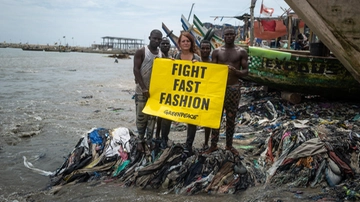Plastic Free July, how the global challenge that has already eliminated 10 million tons of waste works

Making us more aware of the excessive use of single-use plastic that we make every day: this is the goal of the Plastic Free July challenge, a free, non-profit initiative born from an idea by Australian activist Rebecca Prince-Ruiz who, in the summer of 2011, asked her children, colleagues and friends to eliminate the use of single-use plastic for the entire month of July.
From that simple challenge, a global mass movement was born, involving 326 million participants in 190 countries . Anyone can participate in the initiative by registering via the appropriate form on the site . After registering, each participant receives advice on how to eliminate single-use plastic from their daily lives.
In addition to suggestions to put into practice immediately, you will receive news and personal stories from other participants. The first rule is very simple: use what you already have at home! For example, you can start by avoiding throwing away the reusable plastic containers that we own and start reusing them. A seemingly trivial rule, but which already allows you to eliminate a huge amount of plastic waste .
Here are some other easy-to-implement tips : bring or borrow a reusable coffee cup, find plastic-free alternatives for fruit and vegetables, use reusable shopping bags, refuse plastic straws when ordering a drink and opt for a reusable alternative, use reusable water bottles instead of buying plastic bottles, avoid plastic containers used for meat, fish and delicatessen products. And then the three classic Rs of ecology: reduce, reuse, recycle.
In addition, you can avoid using cleaning products packaged in single-use plastic, choose natural fibers in clothing instead of synthetic ones, refuse single-use plastic bathroom products, replace disposable razors with reusable alternatives, and so on. In short, many small gestures that are easy to implement that, combined, generate a big change.
By doing so, in the last five years the participants have avoided 10 billion kilograms of household waste , "because – as stated on the official website of the campaign – millions of people have chosen to change, for cleaner streets, healthier oceans, more beautiful communities or simply to do the right thing".
Reducing the use of plastic as much as possible helps to preserve environmental resources from contamination and pollution . An extremely current topic, if we consider that every year up to 12 million tons of plastic end up in the seas and oceans: the equivalent of a garbage truck per minute.

Most plastic pollution originates on land. Plastic comes mainly from household and commercial waste that, if dispersed in the environment, ends up in rivers or sewers, and then reaches the sea .
Another source of pollution is our clothes : so-called microfibers end up in the drain when we wash synthetic garments in the washing machine. An average load of laundry can release about 700,000 microplastic fibers , less than a millimeter long, into the water. These are too small to be filtered by purifiers and end up accumulating in river beds or being carried out to sea.
Finally, about 20% of marine plastic comes from human activities in the open sea, mainly fishing. In 2019, a Greenpeace report revealed that every year 640,000 tons of “ghost gear and nets” – abandoned, lost or discarded fishing gear – end up in the oceans, where they are left behind. This is equivalent to 50,000 double-decker buses full of plastic every year.

It is therefore urgent to intervene, given that – as the United Nations Environment Programme points out – by 2050 there will be more plastic than fish in the oceans. In particular, this year's Plastic Free July campaign focuses on the small changes that each of us can make to reduce plastic waste, with the slogan "Small steps, big difference" .
What to do? Choose a single-use plastic to avoid, or make a commitment to eliminate single-use cups, plastic beverage bottles or plastic food wrappers . “These Top 3 items – say the promoters of Plastic Free July 2025 – are single-use plastic items that we commonly use every day and that most of us can easily replace.” A great way to continue to grow the positive impact of Plastic Free July is to finally share the challenge with others, involving and motivating them in the challenge .
Luce







